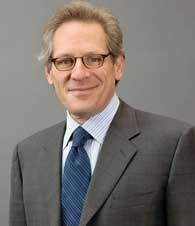|
Executive Interviews: Interview with Tamara J Erickson on Managing Troubled Times
March 2009
-
By Dr. Nagendra V Chowdary
 Stewart D Friedman
Stewart D Friedman Stewart D Friedman, Stewart Friedman, Practice Professor of Management Director, Wharton Work/Life Integration Project 
First, a word about your latest
book, Total Leadership: Be a Better
Leader, Have a Richer Life. What is
total leadership and focus of the
book?
The purpose of the approach is to
improve performance in all parts of
life – work, home, community, and
self (mind, body, and spirit) – by
finding mutual value among them.
The book is a practical guide for how
to achieve this, with step-by-step
instructions and illustrative cases,
based on the course I teach at The
Wharton School and in companies
around the world.
|
|
-
The New York Times (May 28,
2008) observed, “Students talk about
Stewart D Friedman, a management
professor at the Wharton School,
with a mixture of earnest admiration,
gratitude and rock star adoration.”
What do such adulations mean to
you?
My students and clients inspire me
with their courage and dedication to
becoming better leaders and leading
richer lives. The Total Leadership
program requires a commitment to
learning and growth, which is never
easy but usually rewarding. My
primary role is to clarify the goal,
encourage the process, and then
removemyself asmuch as possible so
that the participants take ownership
of their development. -
What qualities do you think a Bschool
teacher should possess and
hone? Should he be good in
teaching? Should he be good in
research and publications? Should
he be good in consulting?What is the
relationship between these three
areas of faculty expertise? Or are they
Business-school specific?
The business school professors I
admire most possess that rare
combination of talents and
experiences that enable them to be
knowledgeable and authoritative yet
empathic and genuinely concerned
about their students. While I believe
that experience outside of the academy is useful, these qualities
may be evident no matter one’s
particular background. What changes have you observed
in management education in the last
decade – from the standpoint of
student selection, curriculum, faculty
composition, pedagogical
methodology and student
assessment? Do you find that Asian
business schools (CEIBS, Asian
Institute of Management, Indian
School of Business, etc.) are catching
up with Ivy League Business
Schools?
The globalization of management
education is a fascinating trend, and
it’s clear that the US no longer
controls the market! The major trend
that I’ve observed is an increased
commitment to relevant content,
rooted in evidence, and greater value
placed on learning from experience. Can leadership be taught?Why is
it that leadership has been on the
engaging agenda of companies,
academicians, consultants, and even
countries?
I’ve long believed that leadership
cannot be taught, but it can be
learned. Indeed, it must be! It is the
same as for any performing art or
sport – you can always improve your
capacity to lead, and anyone can do it,
if they are willing. As I describe in
my book, leadership offers limitless
resources – the more the better – and
organizations of all kinds benefit from
members feeling like leaders, capable
of mobilizing people toward valued
goals. What according to you is the
difference between leaders and
managers or leadership and
management? Are these differences
subtle or substantial in terms of
making someone a highly valuable
resource?
Unfortunately, there are many
managers who are not good leaders
and, fortunately, there aremany good
leaders who have no formal authority
to command other people.
Leadership is not about a position;
it’s about clarifying what is important,
respecting and engaging others, and
continually experimenting with how
things get done. In most circles,
management has come to mean the
more administrative aspects of
planning and control. Are leadership styles influenced by
national cultures?
Of course! How could they not be?
Every leader has a different style and
what works in one situation will not
work in others. The ability to
articulate a vision and inspire others
to follow has to be shaped to fit the
values and interests of the people.
1.
Troubled Times Case Study
2. ICMR
Case Collection
3.
Case Study Volumes
|
